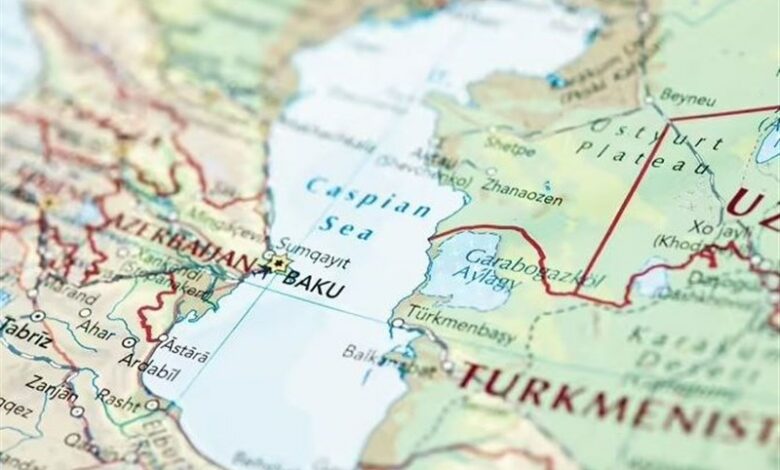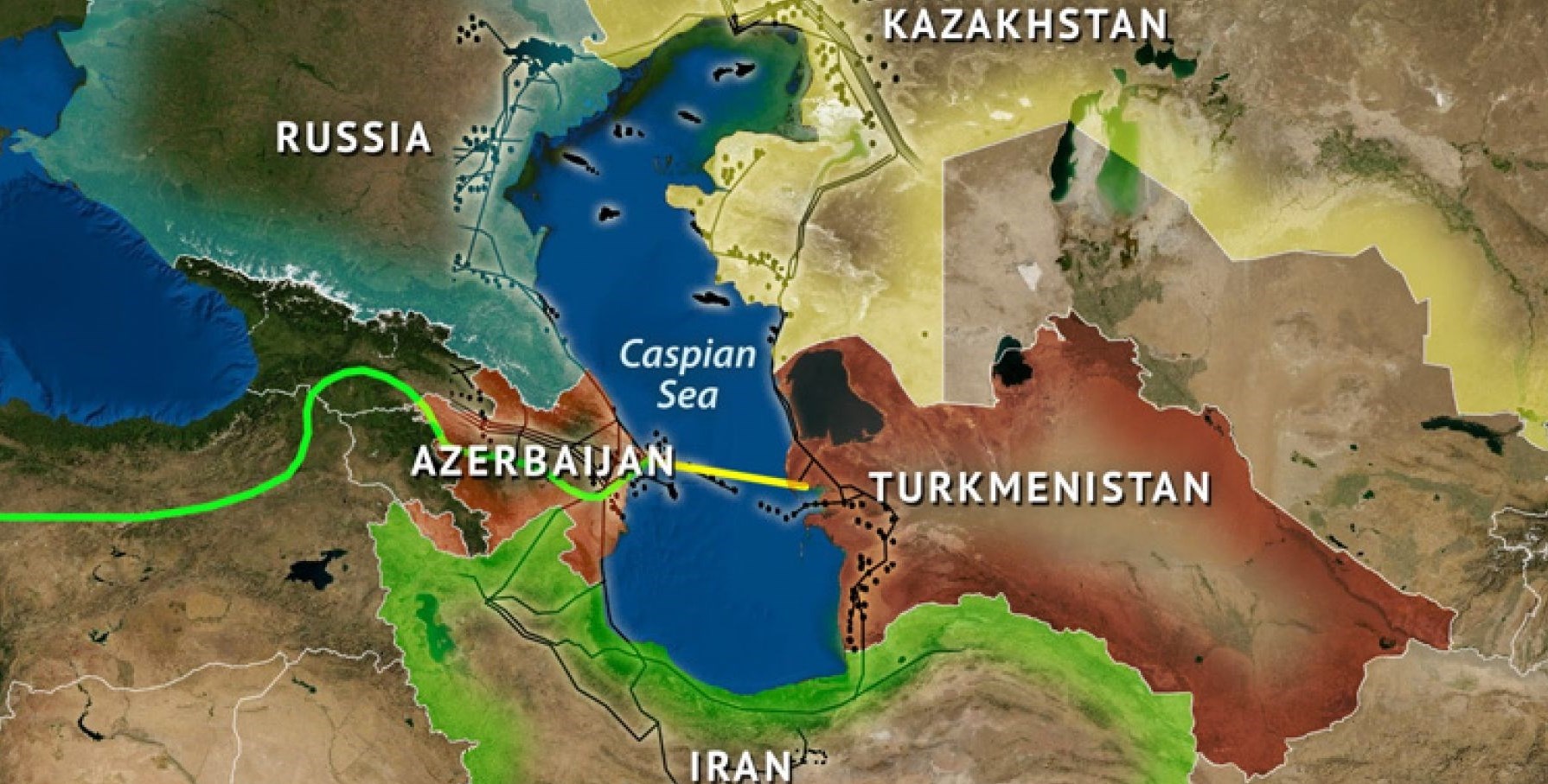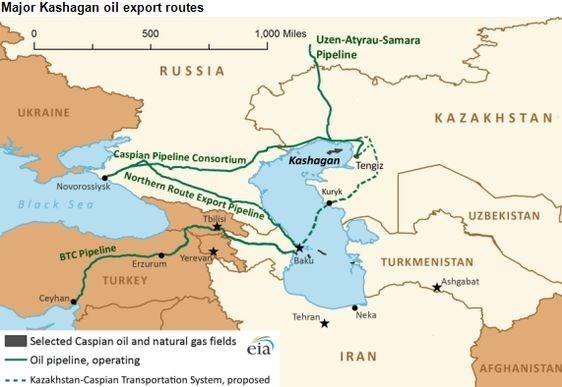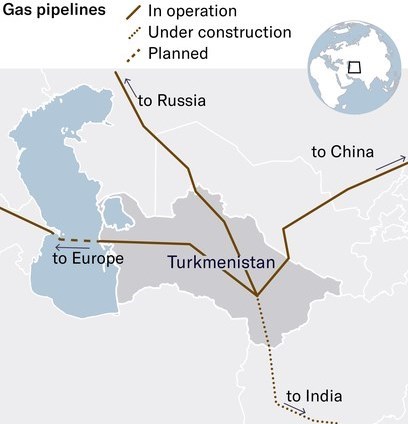The Caspian Sea: Strategic Objectives and New Challenges for Russia

| The increase in geopolitical risks in the Caspian region and the possibility of adjusting the direction of the foreign policy of the Caspian border countries to the west create new challenges for Russia in terms of defending its interests and minimizing the negative impact of Western sanctions. |
According to Tasnim news agency, it seems that in 2024, the sea Due to the high volume of upcoming events, the Caspian should become more and more the focus of Moscow’s regional policies, especially that the countries bordering this sea have adopted independent and sometimes Western policies in the energy and transportation sector.
In addition, the presence of extra-regional countries and actors such as the United States and the European Union can not only challenge the security of Russia, but also the alliance between the five bordering countries of this sea, which until recently adopted unified positions on key issues in the region.
The geopolitical situation of the Caspian Sea can be conditionally divided into “before” and “after” February 2022. Until the beginning of 2022, the situation in the region can be analyzed in the framework of the stable trends that emerged after the collapse of the Soviet Union. The rights of this sea reached concrete and acceptable results in 2018 with the signing of the termination convention. Regarding the architectural model of the new pipeline and the discussion on the routes of supplying hydrocarbon resources to foreign markets, it generally brought predictable results. The same applies to the development of shipping, the military field and other issues.
But after February 2022, when the relations between Russia and the West are seriously deteriorating due to the start of the war in Ukraine. institution, the role of the Caspian region began to change rapidly. These changes can be clearly seen in the policies of each Caspian border country. This forced Moscow to find new approaches to implement its regional policies in the Caspian Sea, taking into account the current regional and global conditions.
Looking for difficult decisions
The Caspian region has traditionally been one of the focal points of Russian regional policy. Historically, the Caspian Sea and its surrounding areas served as trade routes, and the main goal of Moscow’s policy in this area has been to ensure the security of transportation routes in this sea, as well as the development of shipping and fishing.
Moscow to advance its strategic interests in This area has benefited from various tools such as bilateral or multilateral alliances depending on the prevailing conditions in the region, therefore Moscow was able to defend its position by maintaining partnerships in the region.
Result of actions The Kremlin and other countries bordering the Caspian Sea ratified the Convention on the Legal Status of the Caspian Sea along with other countries in August 2018. This document was discussed for more than 20 years.
The negotiation mechanism, which consisted of special working group meetings, conferences of foreign ministers and summits of the countries bordering the sea, brought closer positions and resolved conflicts in Between the “five countries” that border this sea, it became possible.
This document included a number of basic positions and became the foundation for the further development of relations between the countries of this area. These issues included regional development, conditions for the construction of energy transmission pipelines along the Caspian Sea, and related security issues, which have become of key importance to Russia over time. Of course, it should be noted that the convention did not resolve all contradictions, but it created a legal basis for more and more interactions in the Caspian Sea.
Russia was able to violate a number of basic regulations which he was interested in, was included in this convention, but he did not eliminate the most important challenge of the Kremlin, which was the possibility of influencing the policies of countries bordering this sea.
Since the 1990s, the western countries They promoted an alternative to the export of hydrocarbon resources that should not cross Russian soil. Some of the proposed projects, such as the Baku-Tbilisi-Ceyhan oil pipeline and the Baku-Tbilisi-Erzurum gas pipeline, were implemented, while others remained only on paper.
For example , Western governments, primarily the United States of America and the European Union, have continuously promoted the idea of implementing the Trans-Caspian pipeline, which would run from Turkmenistan and Kazakhstan along the bottom of the Caspian Sea to Azerbaijan.
This long-standing idea was seen as a powerful tool to influence the policies of the Caspian Sea countries, for whom alternative routes of oil and gas exports were very important, such as Russia and Iran.
Some Caspian border countries also welcomed the activity of Western countries and this is an opportunity to attract Supporting and creating conditions to attract investment. From the point of view of some of these governments, extra-regional countries were seen as attractive partners with whom many hopes were placed to solve economic problems.
Development of commercial and economic cooperation between Russia and the Caspian Sea countries It was taking shape that there was an increasing competition between the five countries bordering this sea in the field of cargo transportation.
All the countries bordering the Caspian Sea have modernized their infrastructures, which allows for an increase in the volume of cargo supply. has provided in this area. At the same time, Caspian Sea countries tried to participate more actively in global infrastructure projects. In particular, their attention has been drawn to the project of supplying goods from China to the European market (East-West corridor).
The situation NEW, NEW CHALLENGES
The geopolitical situation in the Caspian Sea began to change dramatically after February 2022, when Russia began its operations. Since the West has not been able to use its tools to influence Russian politics and weaken Russia’s economic potential, the United States and the European Union have expanded the geography of their sanctions policy.
In addition to Russia, Moscow’s partners were also in the circle of these threats, especially the political pressure against the countries of the Caspian Sea intensified by being pressured to accompany the sanctions policy against Russia.
Despite the increase in pressure On Russia and its partners, the Caspian Sea countries continued to discuss the problems of the region. In addition, issues have accumulated that require the participation of regional leaders.
As a result, in June 2022, the 6th summit of Caspian countries will be held, and the Russian side will emphasize the importance of solving all regional problems in He emphasized the framework of agreements between five countries and creating conditions for sustainable development. Also, Moscow had to quickly create and implement mechanisms to reduce the negative impact of Western sanctions.
The reflection of these policies showed itself in the expansion of commercial and economic cooperation with the countries of the Caspian Sea. Therefore, the second Caspian Economic Forum was held in 2022 with the aim of resolving issues related to commercial and economic interactions and the implementation of transportation and energy corridors. In this forum, Moscow strongly promoted the creation of new transport and logistics routes and the North-South International Transport Corridor project.
In recent years, the volume of trade between Russia And the Caspian border countries have been continuously increasing. According to the President of Russia, the volume of trade with the countries of the Caspian region will increase by 35% to 34 billion dollars in 2021.
Thus, in 2023, the trade turnover between Russia and Azerbaijan , Kazakhstan and Turkmenistan increased by 17.5% and reached 6 billion dollars. At the same time, in some cases, it has faced a decrease in business volume. For example, with a 17% decrease in the volume of trade, Iran has decreased to 4 billion dollars compared to 2022. In general, the active development of trade took place within the framework of the North-South transport corridor, which is located along the east and west coasts and includes the trans-Caspian route.
Expansion The interaction in the Caspian Sea and the movement of countries bordering this sea towards solving regional problems have caused dissatisfaction among Western countries. In addition, the sanctions of the European Union and the United States did not bring tangible results in the Russian economy. In this regard, the pressures on the Caspian border countries increased, and this obliged Moscow to maintain the existing format and level of interaction among the five Caspian border countries.
Tight knot of problems
Russia in 2024 with the hostile policies of Western countries with the aim of reducing this country’s influence in the Caspian region, from Through investment in transportation and energy routes, the direction of changing the foreign policy vector of Caspian border countries is facing west. Therefore, the numerous visits of representatives of the European Union and the United States should be analyzed in order to influence the political leadership of the Caspian Sea countries and encourage them to support anti-Russian policies.
The energy factor will continue to be the main axis of the policies of the extra-regional governments in the Caspian Sea area. Policies that are promoting new architectural ideas for the provision of hydrocarbon resources in this region.
On the one hand, during the last decade, we have seen the development of oil and gas export routes to foreign markets from the Caspian region. . This development is based on proven hydrocarbon reserves, consumer demand and pipeline capabilities in this area. At the same time, the development of new projects is strongly dependent on the political components in this region. For example, we can mention the Trans-Caspian gas pipeline project, which goes along the sea floor from Turkmenistan to Azerbaijan and then to Turkey, and has the political and intelligence support of the United States as one of the partners of this project.
The promotion of alternative routes for the supply of oil and gas to Europe from a route other than Russian soil has become one of the most important concerns of Western countries. In fact, the West, ignoring the technical problems and production capacity, leads the countries along the Caspian Sea to support new hydrocarbon export routes.
Western countries are starting to discuss cooperation issues. They are in the field of energy, an issue that the countries along the Caspian Sea have shown great interest in, and they ignore Russia’s capacity to transfer energy to European soil. The Caspian border countries, in turn, rely on the support of extra-regional actors, waiting for the implementation of new energy and transportation projects, as well as the expansion of the capacities of existing routes.
Kazakhstan Tengiz oil field
In this connection, we can talk about the expansion of the Trans-Caspian international transport route, which Kazakhstan and Azerbaijan are one of its important partners. In 2023, Kazakhstan began the test supply of oil from the Tengiz field on the Tengiz-Aktau-Baku-Ceyhan route, and then in January-February 2024, Kaz Trans Oil Company will supply 1,000 tons of Kazakh oil from the Tengiz field on the pipeline route. It exported Baku-Tbilisi-Ceyhan oil.
This multimodal transportation included the use of pipelines as well as rail and sea transportation. However, this route needs to develop its own infrastructure. Expanding supply to China is also associated with high costs. Despite Kazakhstan’s steady export of oil to Russia, the country that hosts most of Kazakhstan’s oil exports, Kazakhstan is seeking to demonstrate its readiness to diversify its hydrocarbon export routes.
Nearby countries Caspians paid a lot of attention to attracting foreign investment in their oil and gas fields, and therefore, in this period, they showed the greatest desire to strengthen political dialogue with Western countries. In the meantime, Turkmenistan showed the greatest interest in attracting foreign investment in order to develop the “Galknish” oil fields.
Galkenish oil field of Turkmenistan
Active interaction with representatives of the military and foreign policy departments of the European Union and the United States and cooperation on a wide range of issues indicate a rapid change in the foreign policy foundations of these countries.
In addition, the West tries In the issue of anti-Russian policies and sanctions, it will put pressure on the Caspian border countries, and this may lead to a decrease in the level of commercial and economic interactions and the emergence of political conflicts between Moscow and the capitals of these countries, and finally, it will greatly reduce the level of regional cooperation. lead to weakening common approaches to solving regional problems.
Iran
The aggressive policy of the West forces Russia to pay close attention to the Caspian Sea route. Therefore, in the current situation, Moscow’s priority is to complete and implement the North-South International Transport Corridor project.
In 2023, Moscow signed a contract with Iran to build a part of the corridor That is, he concluded the Rasht-Astara route. Due to the extensive sanctions against Russia, this transport corridor should significantly expand Russia’s opportunities to develop trade and economic relations with friendly countries, so that the Kremlin can compensate for some of the damage caused by the loss of European markets. Also, the development of maritime infrastructure and the expansion of the capacity of ports located in Iran and Russia are part of Moscow’s mandatory plans to maximize the commercial capacities of the North-South corridor. Now on an irreversible and unprecedented scale, Caspian infrastructure projects could provide Russia with a “window” of new opportunities.
However, it is important that the Kremlin maintains its position To neutralize the political and commercial pressure of Western countries on each and every country on the Caspian border. Otherwise, countries like Azerbaijan, Turkmenistan, and Kazakhstan can cooperate with the West to advance their interests, and the presence of extra-regional countries in the Caspian Sea area can create a new balance of power in this region, which will certainly pose serious risks to the national security of Russia and Iran. will face.
Increasing geopolitical risks in the Caspian region and the possibility of adjusting the direction of the foreign policy of the Caspian border countries to the west, new challenges for Russia in relation to defending its interests and at least It creates a negative impact of Western sanctions.
The new cold war between Russia and the West has completely affected the Caspian region. The sanctions regime imposed by the West can lead to a situation where the Caspian border countries are given an ultimatum: either support anti-Russian sanctions or pursue an independent foreign policy and be subject to sanctions. In this case, the geopolitical situation of the region may undergo significant changes.
Author: Mehdi Seif Tabrizi, researcher of Russia and the Caucasus
end of message/
| © | Webangah News Hub has translated this news from the source of Tasnim News Agency |





